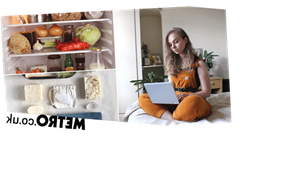Making the decision to radically reduce your plastic use and household waste can feel daunting.
Do you need to get a load of reusable gear? Will it cost tonnes of money? What if you mess up and get an iced coffee in a plastic cup?
Laura, 23, also known as Flaura and Fauna, wants to offer some reassurance to get people aboard the low-waste bandwagon.
The speech and language therapist of Sheffield, south Yorkshire, blogs about her journey to going as close to zero-waste as she can, and shares the tips and tricks she finds along the way on Instagram, too.
She’s keen to prove that making a change doesn’t have to be hugely expensive or difficult, and to lessen the pressure to get everything done perfectly right away.
Laura’s journey began when she went to university and started living independently for the first time, which made her newly aware of just how much plastic waste she produced.
‘I realised I could make changes,’ Laura tells Metro.co.uk. ‘Seeing images of animals trapped in plastic packaging had a big impact on me, and I now think about that every time I bin something.
‘Since then, I’ve learned that the production and disposal of plastic can also be linked to many other issues, including environmental racism, soil and air pollution, and the fossil fuel industry.’
To start on her environmentally-friendly life improvements, Laura went vegan, started shopping for food at a zero-waste food store, and drastically cut back her reliance on fast fashion.
She now works to reduce her food waste, making sure to never chuck away food she could eat, avoids plastic packaging, and would rather repair something she owns than buy something new.
But there are plenty of little challenges to overcome – our society still isn’t really made for those trying to reduce their impact on the environment (yet).
‘There are some products that are much harder to find plastic-free,’ says Laura. ‘For example, faux meats, fruit juice, crisps, and berries all tend to be packaged in plastic, and so I have reduced my consumption of these items.
‘In order to prevent food waste, I buy a lot of my food from the yellow sticker clearance section in the supermarket, and so there are some plastic-packaged products that I only really buy when they’re in clearance.
‘Another challenge is that I’ve realised that a lot of waste is hidden, and therefore harder to avoid. For example, if you go to a cafe and get a glass of juice, then that might feel zero waste, but you don’t see that the juice comes from a plastic bottle – just because you don’t see it, doesn’t mean it doesn’t exist.
‘Similarly, there is a lot of focus on items like plastic straws, which make up 0.03% of marine plastics, whilst discarded fishing nets constitute up to 46% of plastics polluting the ocean.
‘The truth is, it’s impossible to be truly zero waste, because we live within a linear system that inevitably creates waste. Until we have a circular economy in which sustainability and waste reduction is prioritised, normal people cannot become perfectly zero waste.
‘This is why it’s so important that we continue to demand system change, regardless of our individual lifestyles.’
While we wait for the world to change, there are small steps we can all make to cut back our waste and live in a more eco-friendly way.
Source: Read Full Article


